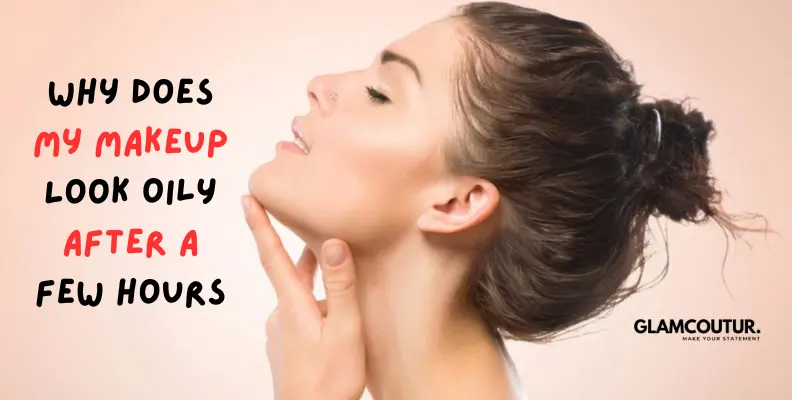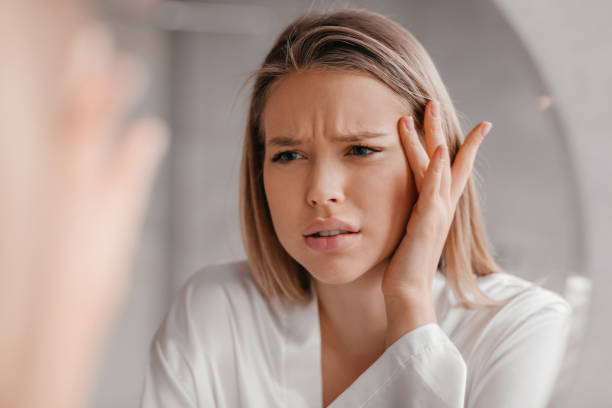Why Does My Makeup Look Oily After A Few Hours

Why does my makeup look oily after a few hours We have all been there: you spend time in the morning perfecting your makeup, only to discover by lunchtime your skin seems greasy and glossy. Commonly occurring and upsetting, the dreaded midday meltdown might be particularly problematic given your efforts toward beauty. You're not alone if you've ever thought. Knowing the causes of this phenomena will enable you to solve problems keeping your makeup appearing fresh and matte all day long.
We'll go over the elements that cause makeup to become oily in this blog article, talk about ways to fight shine, and offer advice on which products best fit your skin type.
Gaining Knowledge on Oily Makeup Causes

It's crucial to know the fundamental reasons of greasy makeup before we start looking at fixes. Usually, the issue results from a confluence of elements including environmental effects, product decisions, and skin type. These are the primary causes of your makeup's greasy turn:
1. Skin type
Your skin type is mostly responsible for greasy makeup. In the event that you have normally slick skin, your sebaceous organs make more sebum, a characteristic oil that the two hydrates your skin and could cause a lustrous colouring. Those with oily skin sometimes battle too much oil production, which can hasten the breakdown of makeup.
2. Wrong Products
Using incorrect cosmetic products could add to oiliness. Using a foundation inappropriate for your skin type, for instance, might cause too much production of oil. While certain powders might not adequately absorb oil, heavy, oil-based foundations can block pores and worsen shine.
3. Wrong Methodologies of Application
Your makeup's wear during the day also much depends on application procedures. Using incorrect equipment or too much product might result in an uneven surface that won't hold up over time. Your makeup might not stick well to your skin without a suitable primer, which would cause oiliness.
4. Environmental Factors
Environmental elements including temperature and humidity could help to explain greasy makeup. Hot and humid temperatures could lead your skin to create extra oil, which would make it challenging for makeup to remain in place. Likewise, external stresses and pollutants can throw off the natural equilibrium of your skin.
5. Dehydration and Diet
Furthermore affecting your skin's behaviour are food and dehydration. Your skin may compensate by generating extra oil when it is dehydrated, which will make you seem oily. Furthermore aggravating inflammation and oiliness might be a diet heavy in processed foods, sweets, and dairy.
Strategies For Why Does My Makeup Look Oily After A Few Hours

After we have investigated the causes of greasy makeup, let's go over practical methods to fight shine and maintain freshness of your makeup all day.
1. Start With Skincare
-
Starting a thorough skincare regimen helps one achieve long-lasting makeup. Good skin care can assist to regulate oil output and provide a smooth canvas for applying makeup. Use this detailed skincare regimen:
-
Clear your skin of grime, extra oil, and makeup residue using a mild cleanser. Look for cleansers meant to help regulate oil production for salicylic acid or benzoyl peroxide.
-
Regular exfoliation helps eliminate dead skin cells that could aggravate oiliness and blocked pores. For gentle shedding pick synthetic peels like beta hydroxy acids (BHAs) or alpha hydroxy acids (AHAs).
-
Saturate: You truly need saturate regardless of whether your skin is oily. Select a lightweight, sans oil cream that saturates your skin without adding over the top sparkle. Search for glycerine and hyaluronic corrosive among different parts.
-
To take care of yourself from UV harm, utilize a wide range sunscreen with SPF 30 or higher.. Sunscreen reduces sun-induced oiliness and helps stop early aging.
2. Prime Your Skin
-
A matte and long-lasting why does my makeup look oily after a few hours depends critically on the procedure of priming. Good primers stop oil from leaking through and assist to produce a smooth surface for applying makeup. Search for mortifying primers intended especially to lower shine and regulate oil.
-
Pro Tip: Pay special attention to priming the T-zone—forehead, nose, and chin—areas prone to oiliness. Press the primer gently—using your hands or a makeup sponge—into your skin.
3. Select A Suitable Foundation
-
Fighting greasy makeup requires a proper foundation choice. Use these guidelines while selecting a foundation:
-
Choose water-based, oil-free foundations made especially for oily or mixed skin. These compositions offer a matte finish free of clogging of pores.
-
Look for long-wear foundations developed to resist grease and humidity. Usually light-weight in texture, these foundations provide buildable coverage.
-
Choose matte finish foundations to help regulate shine all through the day. Steer clear of bright or dewy finishes as they might highlight oiliness.
-
For an ideal and regular completion, apply establishment with a damp cosmetics wipe. Create covering incrementally to prevent a heavy appearance.
4. Adjust Your Makeup

-
Preventing oiliness and guaranteeing longevity depend critically on your setting of makeup. These pointers can help you to properly apply makeup:
-
Utilize a clear setting powder to seal in your establishment and draw additional oil out. Pay particular attention to regions that shine, like the T-zone. Press the powder gently into your skin with a cushioned brush or cosmetics wipe.
-
Finish your makeup application with a setting spray meant to matte finish and control grease. Setting sprays maintain your makeup in place all day and assist it to stay sealed. You may read also this: Benefits of Using a Homemade Face Mask for Glowing Skin
5. Blotting Paper
- A helpful and basic method for directing oil and gleam on-request are smearing sheets. Stow a pack of blotting papers in your luggage and gently blot extra oil without ruining your makeup. For daytime touch-ups that guarantee your makeup stays fresh, blotting sheets are very helpful.
6. Apply Oil-control Products
-
Include oil-control products in your regimen to assist control shine and maintain perfect makeup appearance. Think about applying the following:
-
An oil-free primer helps to smooth out a canvas and stops too much oil from breaking down your makeup.
-
Select a mortifying moisturizer that lessens shine and moisturizes your skin. Search for formulations including clay and niacin amide.
-
Cover flaws and blems with an oil-free concealer to avoid adding more oil to your skin.
7. Daily Touch-Ups
- Maintaining a matte look during the day depends on regular touch-ups. Pack a little cosmetic bag including blotting papers, translucent powder, and a small mirror—touch-up basics. A fast touch-up can keep shine away and rejuvenate your makeup.
8. Change Your Diet
-
The oil production of your skin could be much influenced by your diet. To encourage cleaner, less oily skin, think about changing your diet as follows:
-
Drinking lots of water will help your skin stay from inside hydrated. Good hydration enhances complexion and helps control oil output.
-
Add to your balanced diet plenty of fruits, vegetables, lean meats, and good fats. Foods rich in omega-3 fatty acids and antioxidants can help lower inflammation and enhance the condition of skin.
-
Cut down on processed meals, sweets, and dairy since they can aggravate oiliness and breakouts.
Selecting Products for Your Skin Type

Preventing greasy makeup mostly depends on selecting the correct items for your skin type. This is a guide for choosing items depending on various skin kinds: Visit website for more beauty blogs
Oily Skin
-
Look for a mortifying primer to help to decrease shine and regulate oil.
-
Choose a matte-finish, long-wear foundation devoid of oils.
-
Lock in your makeup and absorb extra oil with a transparent setting powder.
-
Keep blotting sheets on hand for fast touch-ups all through the day.
Combination Skin
-
Choose a primer that balances dry regions' hydration with oil.
-
Use a foundation with a semi-matte finish to cover without drawing attention to dry areas.
-
Apply powder to oily areas—like the T-zone—to help to reduce shine.
-
To keep your makeup in place, finish with a setting spray.
Dry skin
-
Choose a moisturizing primer that offers a seamless basis for applying makeup.
-
For a splendid look, utilize a hydrating establishment with a dewy completion.
-
Apply powder softly, focusing on regions liable to sparkle.
-
Throughout the day, freshen your makeup with a moisturizing spray.
Sensible Skin
-
Look for a primer tailored for sensitive skin and devoid of fragrances.
-
Foundation: To prevent irritation, choose a mild foundation with few chemicals.
-
Use a transparent, devoid of any irritants powder.
-
Carry a relaxing spray to relax your skin and preserve your fresh appearance.
Conclusion
Many people have a regular problem with greasy makeup many hours after application. With the correct methods and tools, though, you can fight shine and get a perfect why does my makeup look oily after a few hours that holds all day. By knowing your skin type, selecting appropriate products, and keeping a regular skincare schedule.
For what reason does my skin look sleek after cosmetics?
Yet, for the people who are inclined to getting an oily face subsequent to putting on cosmetics, you understand better compared to not utilizing a setting shower. Setting splash will secure in the cosmetics on your skin. So your skin might turn oily relying upon the decision of cosmetics and skin type however your cosmetics won't move on the off chance that you utilize a setting splash.
